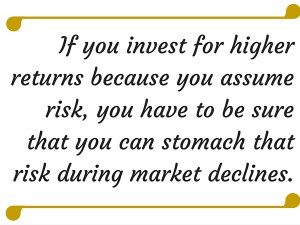Dealing with stock market declines requires discipline
January 21, 2016

The financial markets are melting. Is your financial future at risk? That depends.
How you react during periods of market decline will be one of the most significant factors shaping your financial success for decades to come.
In the two weeks since we celebrated the beginning of a new year, stock markets around the world have started to crash.
As of last weekend the Canadian stock market was down a total of $150 billion.
The same magnitude of decline has occurred in United States.
The value of oil is plummeting and with it goes the value of the Canadian dollar.
These are difficult times. Difficult financially and difficult emotionally.
This is a good time to return to the basics of investing and put recent market volatility in its proper perspective.
We will provide the logic, however, we all know that sometimes logic is not able to quell emotional anxiety.
In economic terms, risk and return are related. For example a risk-free investment is considered to be a one month T-bill.
T-bills pay interest, and at the end of the month you get your money back. Interest and return of principal is guaranteed by the government.
That is considered to be the floor of investment returns. There is virtually no risk and the return is very low.
For an investor to get a higher return they have to assume more risk.
Risk is nothing more than uncertainty. The owner of a T-bill is risk free and the owner of stocks assumes risk.
If stock market returns were guaranteed, and therefore all the risk removed, then that would be extremely harmful for most investors.
If risk is removed from an investment then the amount of return an investor can expect to receive will be more similar to the low paying T-bills.
Most investors require a higher rate of return than is offered with T-bills in order to meet their financial objectives.
In that regard, risk is your friend.
It is our opinion that all investors should have an investment policy statement.
This outlines the parameters of a long-term investment strategy, and should give a history of market volatility for the type of investments you own.
Seeing historic market volatility can be extremely helpful in helping you manage your expectations.
We all know that markets decline so this recent decline, in theory, should not be a surprise.
Market turbulence is normal and all investors should have a seat belt to help guide them through these rough times.
Some investors invest for the short-term, long-term, or some of both.
Short term investing is normally done in more conservative securities such as bonds or other fixed income instruments.
Money needed in the short-term should not be subject to market volatility.
Risk hurts you in the short-term however in the long-term risk can be your ally.
Again, it is the risk that allows you the opportunity for a greater investment return.
So much for the theory, now let’s look at reality and the emotional roller coaster that comes during times of economic panic.
We humans are emotional and sometimes that emotion motivates us to make a short-term decision on something that was initially established for the long-term.
Some investors collapse their long-term strategy and sell investments during times of market decline.
That is why investors’ returns are far worse than the underlying markets they invest.
It is all about timing.
If you invest for higher returns because you assume risk you have to be sure that you can stomach that risk during market declines.
RELATED ARTICLES
